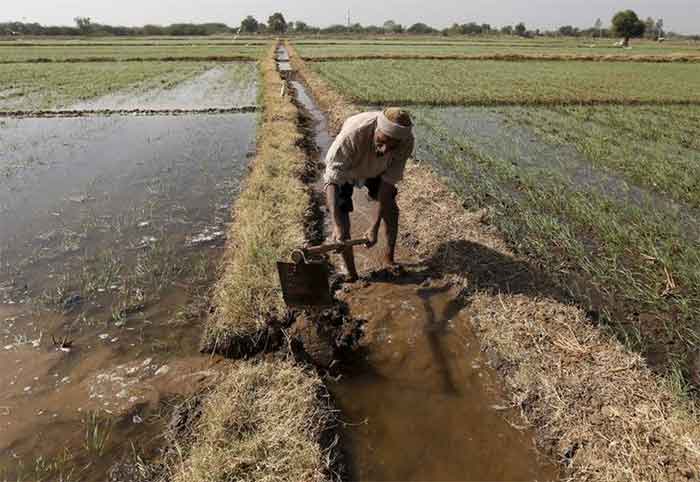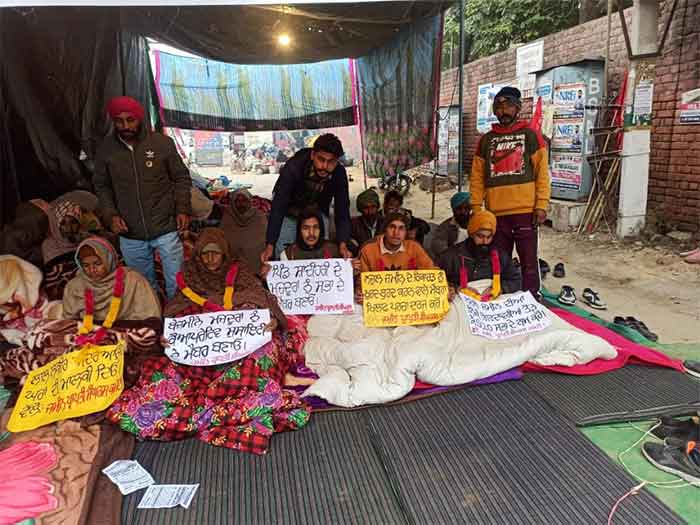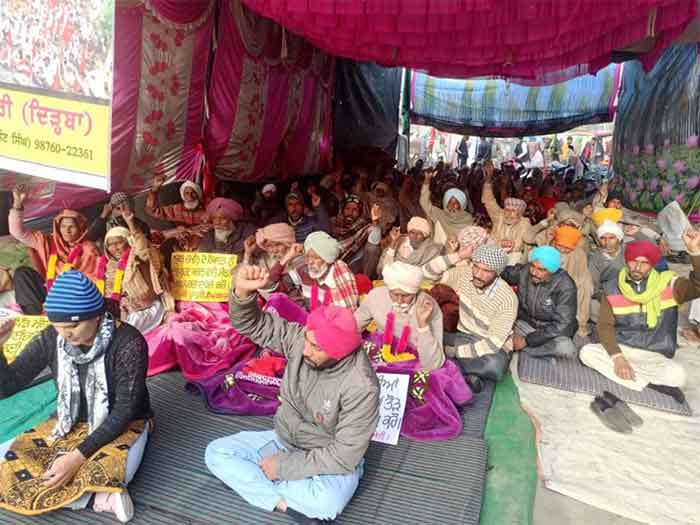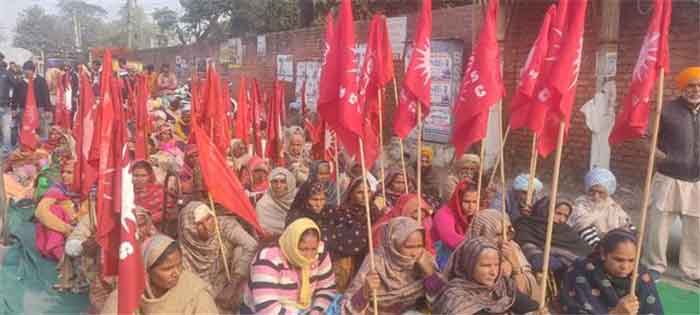Spark of Resistance ignited by dalit agricultural labourers led by Zameen Prapti Sangharsh Commitee shimmers at a crescendo to engulf many a village in Punjab to score heroic victories

The flag of the Zameen Prapti Sangharsh Commitee in recent weeks is heroically fluttering in many villages of Punjab in Sangrur-Patiala region after the implementation of the land distribution of the third phase. Under the leadership of the ZPSC the dalits have garnered every ounce of energy to rekindle the flame of resistance and justice and thwart any bid in their land being auctioned at much cheaper rates or purchasing land at exorbitant rates. It is one of the most significant developments in light of the Neo-fascist Brahmanical monopoly prevailing in Punjab bad India. Heartening to witness the dalit community asserting their rights brimming with such self confidence. The spark ignited is turning into a prairie fire. All democrats must salute these developments which pave the path for genuine revolutionary alternative.
In Village Batiadana 39 acres was redistributed amongst the dalits. In Village Kapiala 112 big panchayats purchased scheduled caste land .In village Chaudharya dalits heroically resisted dummy auctions where land was awarded at exorbitant rates to dalits. In Garacho village dalits planted red flags after emerging victorious in gaining land rights. This was a truly landmark victory in the history of ZPSC and sowing base of future strategy. In Bhattiwala Kudan Fatehmarji attempts were made by the police to thwart land bidding auctions. In Jhaneri 23900 acres at Rs 40 per acre were distributed. In Kheri resolution was adopted to launch programme .This demonstrates how the spark of dalit resurgence is engulfing many an are of Punjab in challenging hegemony of the Brahmanical social order and reposing faith in Dalit community to win their genuine rights. In Nabha the authorities sabotaged a concerted effort of the dalit community to challenge the dummy land auctions by framing activists in false cases. Here dalits heroically evaded a lockdown declaration. In village Jaloor dalits won the right for 1/3rd panchayat land. In village Radhiana village major plans were made to chalk out the future strategy .In the very core a fierce two line struggle had been waged to challenge upper caste tyranny which was capped by a gherao of the cabinet minister on May 21st in Patiala.
This year 228 Dalit families have taken 93 acres of reserved land from the total village common land of 280 acres on annual lease at Balad Kalan village. They have not only produced required wheat for themselves but also selling the extra produce. At Bharo village, 169 Dalit families have taken 28 acres and are cultivating crops.
These happenings testify how the spark of dalit resurgence is engulfing many and are of Punjab in challenging hegemony of the Brahmanical social order and reposing faith in Dalit community to win their genuine rights
The convenor of ZPSC, Mukesh Mulaudh revealed how land was auctioned at a most unfair rate of Rs,20,000. Activists of ZPSC revealed how the lockdown shattered the hopes of the dalit community in terms of employment .and in galvanising maximum forces for resistance for rights
One very positive aspect about the ongoing farmer’s agitation against agricultural bills has been the cooperation of the Jat landed peasantry with the landless dalit labourers who earlier often socially boycotted them. In numerous instances now landed jat peasantry cooperate in transactions and work .Gurmukh Mann in an interview narrated an instance when Bihari agricultural labour were socially boycotted and left the state, dalit agricultural labour came out in support.
Today it is debatable whether the landless dalit labour is lagging behind the overall farmers struggle, if one assesses comparative mobilisation with landed peasantry in conferences or rallies.. It is also arguable whether cooperative farming system installed by the Zameen Prapt Sangarsh Commitee has created a genuine revolutionary alternative in the social base. A very important aspect is wedging the gap of the dalits with the Jat landed poor peasantry. I myself was a witness to the gap in comparative mobilizations sin conferences in Punjab, with great dominance of the landed peasantry.
Joint farming on reserved land in various villages by landless Dalits has proved to be a boon for them. Despite remaining without work due to the pandemic since last March, the landless labourers have adequate wheat at their houses.
Despite opposition from upper caste, Dalits at various villages have produced wheat and divided the crop as per their share.
“Like past this year also each family has received 500 kg of wheat from joint farming. We urge the state government to promote the concept of joint farming to save Dalits from starvation as many upper caste people have been trying to take reserved land under the names of dummy candidates,” said Charan Singh, a member of the Zameen Prapti Sangharsh Committee (ZPSC) from Balad Kalan village.
In my personal view wherever the heroic contribution or gains, the subjective class factor and aspect of united front with Jat peasantry has to be analysed seriously. Serious differences exist of the mass organisations like Punjab Khet Mazdoor Union on the practices or policies of the ZPSC on the land captures in Sangrur,which in it’s view negate class angle. No doubt PMKU morally supports ZPSC and to the last core opposes any repression unleashed on it, but feels when cutting the trees, one must not loose sight of the forest. To me they have a valid point in this.
I recommend all readers to read an article published in The Caravan highlighting the alienation of dalits in farmer’s movement. It is noteworthy that inspite of upholding Marxism-Leninism the ZPSC upholds B.R.Ambedkar as a genuine social revolutionary, by commemorating his birth and death anniversary. Somehow I disagree with this trend which in my view wishes to integrate Ambedkarism with Marxism. Anyway I recommend everyone to give the utmost moral support to the ZPSC and regularly watch interviews of their leaders on youtube. Most positive interviews of ZPSC Leaders Mukesh Mulaudh,Paramjit Kuar and Gurmukh Mann have taken place where they have literally caught the bull by the horn.
In an interview in the Caravan, ZPSC President Maloud pointed out that there is no representation of any labour organisation in the Samyukt Kisan Morcha, a collective of farmers’ groups leading the ongoing movement against three farm laws that held talks with the government. While discussing the role of landless peasants in the movement, Punjab Khet Mazdoor Union secretary Lacchman Sewewala also emphasised that it was important for landless farmers to have a say in the movement and in negotiations with the government so that they could put forth the issues that were specific to them. “Their own political identity should emerge now,” he said. When asked why the labourers were not as dominant in the protests, Sewewala said that they had to stay put in Punjab for their survival as most are daily wage earners. He said they could play a major role in the anti-farm laws movement even if protested within the state and not on Delhi’s borders.
Accordingly, on 28 February, when PMKU secretary Lacchman Singh Sewewala was asked why the PKMU cadre did not show up at Tikri despite the announcement to gather there, he said, “We have called our entire cadre back to Punjab to mobilise people for a state-level rally of farm labourers in Bathinda on 15 March.” But the 15 March rally was a smaller event of some 4,500 cadre. “I told you, the reason is the same that the farm labourers could not afford to skip even a single day’s wage,” Sewewala told me after the event.
During the Bathinda rally, the speakers emphasised why the movement was important for farm labourers. Pointing to how difficult it was already for farm labourers to get their rightful share in the village commons land, Sewewala said, “If you do not raise your voice now then your right over your land would be snatched by the Adanis and the Ambanis.” Sewewala had expressed a similar sentiment at the Barnala rally. He also put the onus on landowners to reach out to the landless peasantry. He recited a song by the revolutionary poet Sant Ram Udasi on farmers and labourers sharing their grief. “Gal lag ke siri de jatt roya, bohla vicho neer vagya. Lya tangli naseeba nu faroliye, toodi vicho putt Jagya”—The landowner hugged the landless as the crops shed the tears, urging Jagga, the landless, to clear their differences.
Vivek Gupta in the Wire yesterday wrote a most illustrative and informative article “How Punjab’s labourers are trapped to live a bonded life” which touches upon the ground realities and need for genuine agrarian radical changes and not mere social reform. It highlights the immense relevance of the survey of the Punjab Khet Mazdoor Union. A must read for everyone as it reflects the oppressive social system as a whole and the vital connection between caste factor and economic oppression.
Harsh Thakor is a freelance journalist. Toured India, particularly Punjab .Written on Mass movements ,,Massline,Maoism on blogs like Democracy and Class Struggle and frontierweekly .An avid cricket lover too who has posted writings on blogs like Pakpassion Indian Cricket Fans and Sulekha.com.
GET COUNTERCURRENTS DAILY NEWSLETTER STRAIGHT TO YOUR INBOX

















































